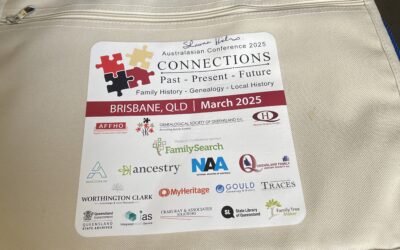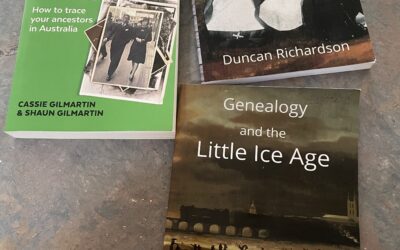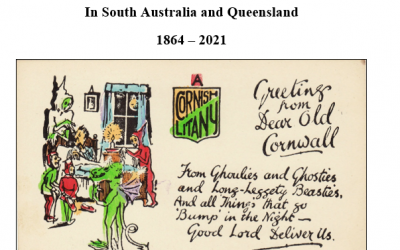This blog challenge is to stimulate my own genealogy blogging efforts in 2014 by focussing on a different kind of genealogical record each week. I wanted a challenge that reflected my own archival background as well as my own genealogy interests and there are probably lots of other records that I could have included. The challenge has an Australian focus but most of these records will be found just about anywhere in the genealogy world.
The 52 different types of genealogical records I finally decided on are listed in no particular order (each week will be a random surprise). Anyone is welcome to do all or part of this blogging challenge. Let me know if you are participating and I will put a link to your post under each week’s challenge.
So far I know of two bloggers who are taking up the challenge and I have put links to their individual entries at the end of each week’s blog if they have submitted something for that week. Thanks Judy Webster, Sharn White, Cassmob and Sharon for participating and encouraging me to keep up the blog challenge myself!
Also participating in this blog challenge:
Sharon – Probates (wills and administrations), Judy Webster 10 Tips for Wills, Intestacies and Probates
Links to Week 1 Military Medals, Week 2 Internal Migration
Week 3 Probates (wills and administration)
Not too many of my ancestors left wills and even if they did, it was usually a basic will leaving everything to their spouse. However you should always look for a will or an intestacy (administration) just in case there is something interesting to find.
My great great grandmother Elizabeth Rosewarne married twice and had children to both James Henry Trevaskis and George Guy. When she died in 1904, her will caused some ill feeling in the family as it only named her two sons James Henry Guy and George Guy. Her daughter Dorcas Trevaskis and son John Trevaskis were not mentioned and they individually visited a solicitor with their suspicions about the will. The executors were their two half brothers and the beneficiaries under the will. The executors eventually gave consent for Dorcas and John to examine the will and no further action was noted on file.
Now before you all start thinking that perhaps Elizabeth was a very wealthy woman, she was not but just over £535 was a sizeable estate for that time. Elizabeth had some mining homestead leases with improvements, furniture, horses, buggy and carts, money in two Australian Joint Stock Bank fixed deposit accounts and 40 mixed fowls. This inventory gave me the exact location of their mining leases and I would never have known about the fowls if the estate had not been so detailed.
Administration of an intestate estate can also lead to the discovery of detailed lists of property and personal effects. I have previously written about the estate of my great grandfather Thomas Price but it is worth referring back to it because it is one of the most detailed lists I have ever seen. Coincidentally it was an Australia Day blog challenge in 2012 so perhaps it is appropriate to remember him again on the approach to Australia Day 2014. Wealth for Toil was about his last job before his accidental death at the Wee MacGregor mine in far north Queensland. He died intestate and the Public Curator administered his estate, hence the incredibly detailed list of effects in his tent at the time of his death. I still get a bit teary every time I read this blog thinking about his lonely life.
Sometimes we look for probate records in the hope that they will solve some family mystery. Late last year I discovered that my great great grandmother Helen Carnegie and her second husband Charles Wademore Chick both left wills in New South Wales where Charles had died in 1929. He left everything (a sizable estate of £4018 including real estate and an insurance policy) to Helen and she returned to Queensland where she died in 1946. Helen updated her will in 1933 leaving everything to her sister Clara Bishop or if she predeceased Helen, everything was to go to her nephew Clara’s son, John Carnegie Davis. My mystery remains – why did she not mention her son James Carnegie who was my great grandfather?
So probate records can fill in missing information on a family, or provide details that would not be found anywhere else or they may just raise more questions. Either way, it is definitely worth checking (usually the records are at the State Archives) to see if there was a will or an intestacy. Remember to widen your search time period as not all estates were wrapped up shortly after death. It may only occur after the death of both partners. There may not be any probate records to find but you will never know unless you look.





In some countries eg It was true in Scotland up til ?it was automatic that widows or eldest sons receive a part of an estate and therefore did not need to be named in a will.
I have seen many genealogy ‘brick walls’ broken down by using wills, intestacies and related records for the subject plus his/her siblings and other family members. My tips and examples are in 10 Tips for Wills, Intestacies and Probate.
Some great tips Judy thanks for participating in my blog challenge